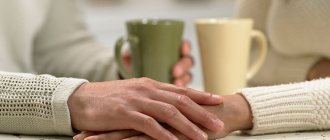- Image from familythrivedoula.com
“I am constantly afraid for my child, help!” – mothers write on parenting forums. The “symptoms” are approximately the same for everyone.
“I’m afraid of swings and slides on a walk, I’m worried that I’ll fall off the sofa, I don’t go far so that I can catch him at any moment.”
“I’m afraid of incurable diseases, that doctors will miss some important diagnosis. I constantly take my daughter for examinations and read articles on the Internet. My husband even took the TV out of the house and stopped paying for the Internet.”
“I’m terrified of other people’s blood, I don’t go to the clinic with my child for tests, I don’t take my child to the dentist, and if this cannot be avoided, I closely monitor the instruments.”
These are just a few of the “horrors” that worried mothers share with each other. The leitmotif in their confessions is: before the birth of the child, I was not such a “crazy person.”
And then, as an excuse: I'm just trying to protect my child. Vera Yakupova about what child protection actually is, and what can be protected from and what cannot . Anxious, controlling and calm mothers tell their stories.
“The idea that we can control everything is an illusion”
Vera Yakupova.
Photo: Pavel Smertin “First of all, I’ll hasten to reassure mothers: it’s normal to want to protect your child! It is our basic need to protect those who are dear to us.
Now let’s figure out what we can protect a child from, what we can’t, and what to do about it all.
Today our reproductive life has changed: we do not give birth to many children, it happens later and more meaningfully. The value of motherhood and a child increases. Accordingly, we pay more attention to this - what is right, what is best.
There is a common joke: today, being a parent means taking care of education, building a good relationship with your child, developing empathy in him, taking him to English, teaching him about sports, and so on and so forth. What did it mean to be a parent 100 years ago? Just feed the baby sometimes. I think this perfectly illustrates everything that is happening now.
Our society is becoming child-centric. And without any excesses, then this, in my opinion, is an indicator of the value of human life. Never before in all of human history has life, especially children's, been valued as highly as it is now. It’s interesting, by the way, that it’s still difficult for us to value our lives, but we’ve already learned to protect our children’s lives.
Many mothers, coming to me for a consultation, say: I’m fine, but I don’t want this to be passed on to the child. That is, it is still difficult to take care of yourself, but it is easier to take care of a child. When practicing a skill, it is always easier to first train it on someone else, and then on yourself.
So caring for children is a very good “symptom” of our society. This suggests that, overall, the value of human life is increasing.
But there is also another side to the coin. Yes, today we have sufficient information, we know a lot about risks, dangers and ways to overcome them. We are quite competent in ensuring physical safety: medicine is now developed, there are various devices - window plugs, car seats, smart watches with GPS, and so on. We know a lot about psychology, we try to protect the child from mental trauma.
But at the same time we forget that man is not omnipotent. These are the rules of the game, this is how our world works: not everything depends on us. This is reality, and we have no other.
And here is an interesting point. When we try to control everything, to be responsible for everything and everyone, it seems to us that we are super adults, we are responsible. But in fact, this is an infantile position. We really want to completely control the world, but this is not given to anyone.
Maturity consists precisely in accepting one's own limitations.
Attributing responsibility to yourself for everything is a heavy burden; it can seriously neuroticize, provoke guilt and anxiety. Often this is characteristic of good parents - educated, thoughtful, socially successful. This is one of the sides of the “excellent student syndrome.”
Since our Soviet childhood, we have become accustomed to hearing: try hard, and everything will be fine. But in reality, life gives no guarantees.
“When the youngest was born, I was overwhelmed”Alena Furman, two children aged 3 and 13: “When my eldest son was born, I was still too young and didn’t worry about anything. We easily survived bruises and bumps, colds, and chickenpox. Even the fact that until the age of three my boy hardly spoke did not bother me too much - after all, then everything got better. But when my youngest was born, I was overwhelmed. I am afraid of everything and almost constantly. Over the past three years, I called an ambulance for my baby 6 times. I get up at night to listen to his breathing. My son scalded his hand with tea - I bought a year's supply of anti-burn dressings - just in case. A street dog bit me - now we go around everyone, even the smallest and most domestic ones. We screwed all the furniture to the wall, put caps on the windows, removed sharp objects and household chemicals. But the problem is that my youngest son is a friend with an awl, so he still manages to create a problem out of nothing. Once in a dream he picked his ear until it bled - it was like a war movie. Then I barricaded myself in the bathroom and had to call the Ministry of Emergency Situations and break down the door. At some point I said to myself: “It won’t be possible to protect him from all dangers.” True, in terms of anxiety, this did not help at all - I still worry. At the same time, I began to worry about the older one. It irritates him terribly, but I still worry. My confessor told me that I need to trust God, but so far I’m not doing well at that either...”
“The child was given away, but they forgot to include the instructions”
When is the alarm triggered? Differently. Some say that they felt fear already in the maternity hospital with their first child, while others complain that given the large age difference between the children, they “went crazy” only with the younger ones.
This is connected not only with the mother’s age - they say that in their youth everyone is careless. This is also an indicator of how society’s attitude towards motherhood has changed over the last 10-15 years, how demands are growing.
But in general, when a child is born, we have a significant person whom we are afraid of losing. When this is the first experience, the mother often feels that she was given a child, but they forgot to attach instructions to it. This device is very fragile, she is afraid of breaking it, does not know how to use it, and there are not even any hints on how to find out - what to do?
In modern society, the transfer of knowledge from the older generation to the younger one no longer works as it did before. Then there were prepared templates for actions, including caring for the child. The world is becoming more complex and changing rapidly. Now parents often know more than grandparents.
You have to try, improvise, look for information, develop your own parental path, based on your values. It's not easy and it's worrying.
How did the changes begin?
For some reason I remembered all those cases when I worried in vain, and those when I forgot to worry, like that evening of my friends’ wedding. My child lives his life regardless of what I think and feel at this time. These are just MY feelings.
This awareness in itself can be a turning point. But what can I do about the terrible pictures of all sorts of disasters in my imagination. I honestly worked on myself. But God knows, all my efforts crumbled into dust: newspapers, television news, parents, husband, friends - everyone considered it their duty to share with me horrific stories involving defenseless children.
Frankly, I gave up, and I thought that, perhaps, I would never be able to send my child alone beyond the school, which is located in the yard, and I can see the whole way from the window.
What's there to be surprised about? What you think about, what you are afraid of, you receive confirmation from everywhere. It's a pity that I didn't know about this earlier. I constantly needed an answer to the question “What should I do?” At first I looked for the root of my fears. Alas, I never found the basic one, although each one I found gave some relief.
Read also: “The power of intention”
"Fear sells well"
Mom is looking. And often he finds something frightening. She is additionally neuroticized by doctors who are ready to prescribe tests, medications, and procedures. Because once the patient has arrived, he must be treated.
Psychologists add fuel to the fire. How many articles have already been published with the headings: “5 phrases you should not say to children”, “10 actions that will cause injury to a child” and so on.
It's coming from everywhere: be careful, parent! One step to the right, one step to the left, and you'll ruin everything! Information plays a big role in the formation of our anxiety. It’s not for nothing that they say: “The less you know, the better you sleep.”
An interesting fact: when I asked mothers after giving birth about whether their children had any health problems, the vast majority, several hundred people, answered “yes” and named, in general, things typical for babies - colic, regurgitation and so on. These are simply stages of development, but they are perceived as difficult and cause anxiety. The stage for fear is ready.
There is too much information today. And on the one hand, this is good - we are warned and armed. For example, recently the Lisa Alert search team began to actively inform that children can die in cesspools. We can take this point into account, avoid such pits, close them, and keep an eye on our children.
But sometimes the news filter is tuned to such disturbing content that it feels like horror is everywhere. Remember the story about the nanny who cut off the child's head?
If you think about it, statistically this is one case in millions, but it sounded so vivid, and in itself it is so scary that my mothers still tell me: we are afraid to hire a nanny, what if something happens? It is clear that the risk of getting hit by a car, for example, is much higher than having the nanny cut off her head, but people are afraid.
Fear sells well. Journalists understand this, “an incident with children” is clickable. At the same time, of course, words are heard that it is necessary to disseminate important information.
It's just that people treat it differently.
Although some people are scared, it doesn’t last long - so I checked everything I could do about this, corrected it and calmed down. And an anxious person simply cannot get rid of these thoughts, even to the point of health problems. “Anxiety grew with the number of children” Svetlana Sokolova, three children, 3, 7 and 11 years old: “With my third son, I became hyper-anxious, because I simply have more experience. Although it seems to me that I am very rational. I love instructions and rules; in my family we try to follow them. When a two-story bed appeared at home, we immediately agreed that the youngest would not climb onto the “second floor.” As a result, the middle son one day, caught on a support, fell from a height and broke his arm. And the youngest fell off the scooter and also broke his arm. After that, I studied all the surrounding roads, and if I know there are potholes, we won’t go on scooters. When children get sick, I try to read about the illness in detail. Once this helped save the life of my youngest son: after chickenpox, he developed meningitis, and fortunately, I knew that such complications could occur, and we managed to quickly call an ambulance. To be able to help my children, I took first aid courses. And at some point I even dreamed of learning how to intubate myself - in case there were difficulties with breathing. My husband laughs: you could! Am I worried? Constantly! But I tell myself: do what you must, and come what may. I believe that it is still impossible to remain inactive.”
“There is always a variable X that does not depend on me”
Photo from theswaddle.com
There is nothing wrong with fear itself, as long as it works the way nature intended. In control too, if it is not hypertrophied.
Each of our emotions has its own role. Anxiety and fear have a protective function; they warn us of danger. It's normal to feel them and then take steps to protect yourself.
A healthy mechanism is to be afraid of heights and move away from the edge of the abyss.
But when this ceases to be a protection, but becomes something that interferes, stops you, if it worsens the quality of life, and prevents you from doing your business, there is a reason to turn to a specialist.
But if anxiety or fears become obsessive, spin around in your head non-stop, you can’t sleep, you can’t let your child go for a long time - in a word, when they interfere with your life, this is not normal. Sometimes this can indicate depression.
You cannot “hide” your worries and fears from yourself. When we come up with instructions for ourselves and our children for all occasions in life, we try to foresee and predict everything, we are hiding our real emotions in a distant drawer.
It is more productive to interact with them openly. Tell yourself: yes, it is normal to feel worried about your child. Yes, at times I feel helpless, but this is also natural.
It is useful to draw in the form of a pie chart what depends on me and what does not depend on me. You need to focus on what you can do. I carry out my program, my area of responsibility, and the rest is as God willing. I just remember that there is always some variable x that does not depend on me.
First responder mom
When I gave birth to my child, it immediately became clear that I was a crazy mom. Until I was 8 years old, at night I listened to how my treasure was breathing (the adenoids were bothering me), checking to see if the blanket had slipped off. When I first took him to kindergarten, I first stood in the corridor, arguing with the director, then under the windows. I was afraid to leave, in case the baby started crying, and I was right there. In general, a “quick response mom,” as one of my friends called me.
In my defense, I will say that my son was anxious and fearful. Like me. I'm still a coward. An apple will not travel far from an apple tree. I am calm when my child is near. And the rest of the time I worry about him. Other children became more independent with age, but mine, not so much. If any child wanted to drink, he loudly announced it. Mine was silent, like a partisan. And only at home it turned out that he was dying of thirst, which is why he was so pale and did not feel well. I didn’t understand why this was the case.
Read also: “The path from struggle to acceptance”
"I knew it"
Photo from dailymail.co.uk
It happens that a mother finds herself in a vicious circle of anxiety: she seems to be waiting for the next incident, and when this happens, she triumphantly says: “I knew it.”
It seems that the child is ready to respond to her expectations - as if he is deliberately throwing up all sorts of reasons for concern. What can you do here?
If the anxiety is situational - in response to some incident that happened to the mother or in her immediate environment, the child has nothing to do with it, the mother needs to work with a psychologist.
For example, the mother of a child with allergies once saw him have a severe attack, and now she is trying to protect the child in every possible way. A psychologist will help you understand what is behind these fears.
If anxiety is a character trait, everything is more complicated. Yes, sooner or later something will definitely happen, but you can approach it differently. Someone will say: it happens, but someone will take what happened as proof that they were right: “I told you so, I knew it!” And then the mother “needs” the anxiety, and she will not fight it.
What should you remember? Our anxiety can stop a child's initiative. If there is danger everywhere, he picks it up and begins to be afraid himself, and does not take the initiative.
Therefore, if even a small incident with the baby increases the mother’s feelings of guilt and anxiety, this is a reason to work with a psychologist.
For those who cannot yet do this, there is the sos-method , which was invented by the Viennese psychologist Viktor Frankl, who worked with obsessive states.
Frankl suggested bringing your fears and anxieties to the point of absurdity, not avoiding them, but, on the contrary, immersing yourself in them as much as possible. At some point a fracture will occur and the tension will decrease.
The beginning of mom's worries
When a woman becomes a mother for the first time, her life changes forever.
A mother, seeing her newborn baby, along with other wonderful feelings, also begins to feel responsible for this small defenseless squeaking lump.
And often with this responsibility comes great concern and anxiety for the baby .
The amount of anxiety may vary. Some mothers, for example, simply try to “with a cool head” anticipate some dangers and prevent them, and there are also mothers who jump up 10 times a night, running up to the baby’s crib to check if he is breathing there.










